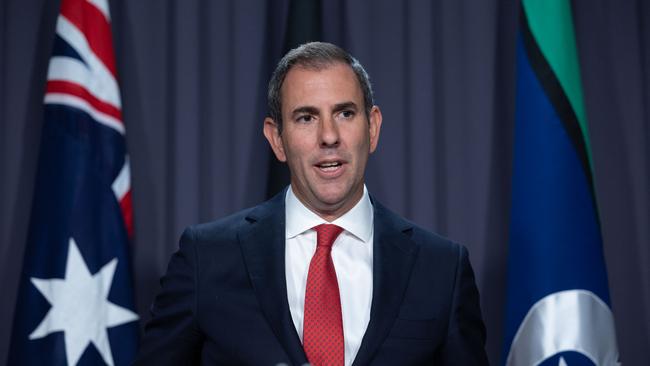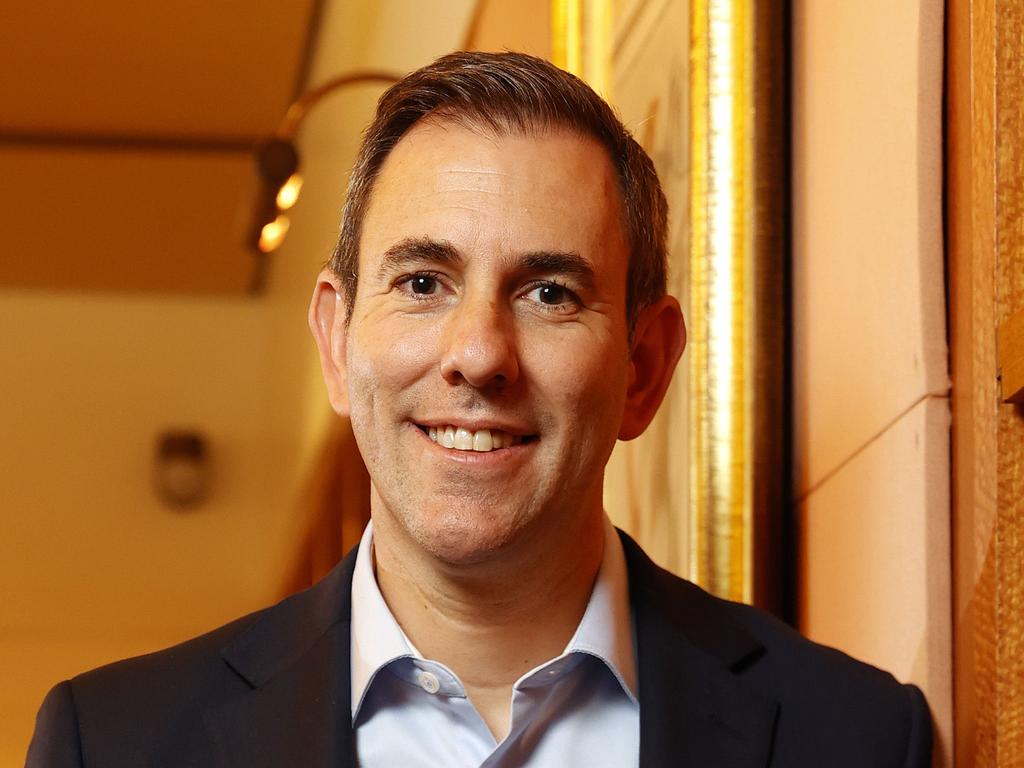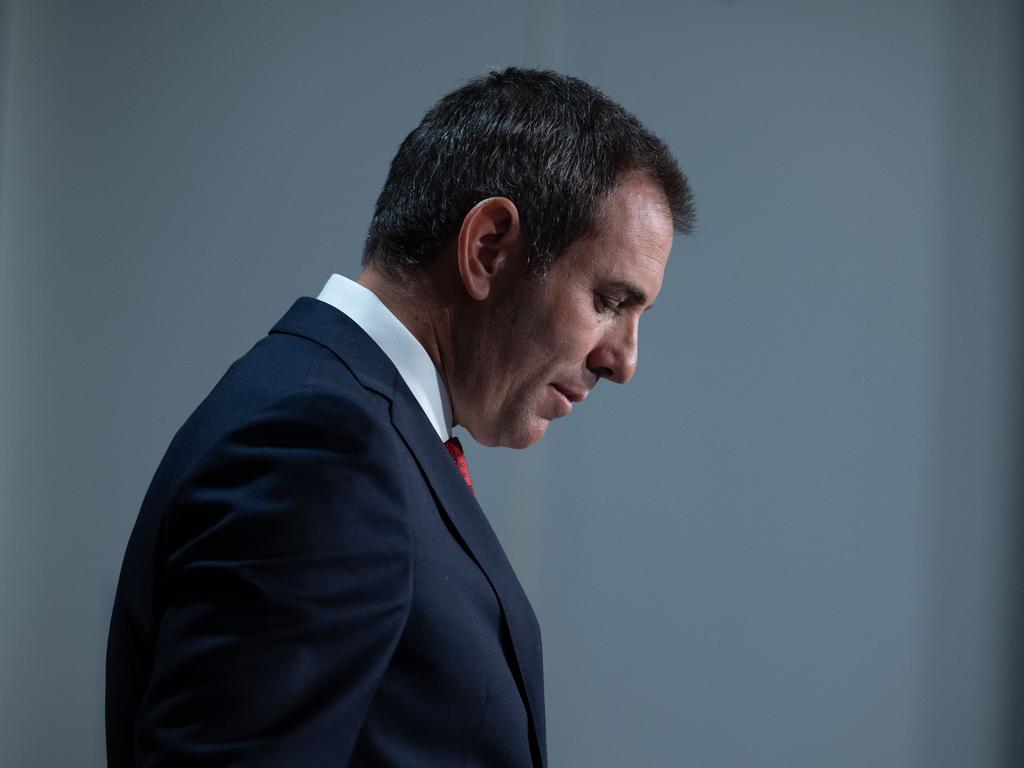Treasurer has indicated he is in way over his head
The Albanese government is basking in the end of its honeymoon period. Incredibly, Jim Chalmers offers a portent that it could be as bad a government as Rudd’s.

Chalmers’ essay on capitalism after the crises reeks of the “great reset” so enamoured by the World Economic Forum set. His essay is Davos man channelled by Logan man.
He kicks off his treatise with a quote from ancient Greek philosopher Heraclitus – a reflection, tellingly, given to Chalmers by a press gallery journalist.
“No man ever steps in the same river twice,” it goes, “for it’s not the same river, and he’s not the same man.”
Well, that is one way of looking at it. Alternatively, we might observe that it is still water, it still flows only downhill, and there are always the perils of drought and flood.
Likewise, to run an economy is to deal with constant changes, but it requires faithfulness to unwavering fundamentals about fiscal responsibility, market forces and the limited but crucial role of government. Every budget is different; and the same.
Still, not for this novice Treasurer the mundane challenges of delivering the $275 annual electricity bill savings he promised, taming inflation, or getting his own budget out of deep structural deficit. Chalmers, like his billionaire and technocrat Davos soulmates, wants to change how the world works, taking the major decisions out of the hands of mere voters and shareholders.
“I think this is our big chance,” Chalmers told the ABC this week, outlining his essay theme of co-opting the private sector to “solve these other intractable social challenges” that hold us back.
“I think we have a window here to modernise our economy and our society and our democracy simultaneously.”
Now if you think that is the latest manifesto from the party for Australian workers designed to entrench our values and egalitarianism, think again. It is just the new age, socialist, mumbo jumbo that emanates from the WEF, EU, UN, and Davos man.

You only need visit The Great Reset website to read Chalmerisms that pre-date Chalmers: “To achieve a better outcome, the world must act jointly and swiftly to revamp all aspects of our societies and economies, from education to social contracts and working conditions. Every country, from the United States to China, must participate, and every industry, from oil and gas to tech, must be transformed. In short, we need a ‘Great Reset’ of capitalism.”
The Chalmers essay turns out to be a cut-and-paste job from this sort of grandstanding, which is also reflected in the corporate economic, social and governance (ESG) agenda, and reinforced by the green-left ideals promoted by unionist, digital media, and shareholder activists.
This stuff is not intellectually original or sound, but it is fundamentally dangerous because it preaches the never-ending expansion of government intervention. Most worryingly, after a period when we have seen unprecedented peacetime government intervention in our national economy and society, mirrored in most other liberal democracies, Chalmers and this contemporary activist set want an even more expansive role for government.
The Treasurer wants to use a “co-investment” model in “more areas of the economy” so that government can direct the use of private funds and “ensure our private markets create public value”.
When he talks about government interventions in response to our recent crises, he does not stop to ponder how government interventions, and then government indolence, created the global financial crisis.
Nor does he consider how the origins of the pandemic likely stemmed from a government intervention through the Wuhan Institute of Virology, or how it was draconian government overreach that inflicted unnecessary economic, health and social pain in countries like ours.
To this day, almost incomprehensibly, there are still professional firefighters in Victoria and NSW kept from work because of vaccine mandates that were never justified and are now scientifically laughable. That is not just my view; former deputy chief national medical officer Dr Nick Coatsworth told me on Sky News this week that he was “astonished and disappointed” vaccine mandates were still in place and that “there is actually no cause for any organisation in Australia, with the possible exception of frontline healthcare organisations … to have vaccine mandates”.
Chalmers and others cite the Clean Energy Finance Corporation as a virtuous example of the “co-investment” that marries private funds with government aims. But he does not stop to consider that there is only one factor that has seen our energy-rich nation plunge itself, over the past two decades, into an energy price and supply crisis – government intervention.
Enforced renewable energy targets and subsidies – and CEFC investments – have deliberately undermined the economics of coal and gas generation in order to force them out. This has decreased the supply of electricity and increased the costs.
But now, with renewable energy unable to supply enough electricity when we need it, further government interventions are subsidising gas and coal generation to keep them in place. Only Joseph Heller could conceive of such institutionalised madness.
This Treasurer should remember from personal experience how the tale of government intervention is not a happy one. He was chief of staff to former treasurer Wayne Swan when he announced four budget surpluses, then went on to deliver only record deficits, while presiding over such grandiose public sector interventions as the failed home insulation scheme, failed cash for clunkers program, failed grocery watch idea, and the failed school halls boondoggle.
As a Queenslander, surely Chalmers remembers the much-vaunted Multi-Function Polis that his native Queensland bid for when he was still in short pants and South Australia eventually scrapped, after lord knows how many millions of dollars were wasted, when the current Treasurer was a young man. Has this boy from Logan not noticed how much money is wasted on substandard acquisitions in defence? Has he never wondered why so many people budget so hard to pay for private medical insurance or private school fees?
This is about more than a lengthy, but thin, essay. This is a deeply worrying insight into the jejune, ideological approach of a neophyte treasurer and new government.
On energy alone, this suggests the Albanese government can only deepen the energy crisis, and therefore our inflation and economic challenges, as the year unfolds. Chalmerism seems to be a catastrophically naive recipe for disaster.
It seems inconceivable that a politician so familiar with the overreach of the Rudd-Gillard era is intent on repeating the dose. Albanese, Chalmers and Labor were sufficiently aware of these pitfalls to promise, before the election, that they would avoid them.
“What we are proposing is responsible and meaningful change, not radical change,” declared Chalmers in an election campaign debate. That was then.
With their feet under their desks for barely more than six months, Labor has now unleashed a plan to completely remake our markets and economy. They are still on their L-plates but are intent on driving Ferraris.
Worryingly, a quick perusal of the green-left media shows they are being encouraged down this path. Keeping in mind how Labor’s energy and climate policies are not only likely to exacerbate the energy crisis but, through the safeguards mechanism, undercut our resources exports, it is extraordinary to see commentators complain they are not radical enough.
The Sydney Morning Herald economics editor Ross Gittins wrote this week that “a further weakness in the government’s scheme comes from its refusal to prohibit any new coalmines and gas plants, despite the International Energy Agency and other international agencies saying the world won’t have any chance of avoiding dangerous climate change if it’s relying on new gas or coal projects”. An economics editor advocates the destruction of two of our top three export industries.
It is clear that Chalmers, Albanese, Bowen and co, take too much of this ideological tosh on board. They seem to be taking heart and drawing guidance from Twitter-level takes on real-world issues.
The Albanese government is basking in the end of its honeymoon period. Incredibly, the Chalmers essay offers a portent that it could be as bad a government as Rudd’s.
If he were with us today, Heraclitus might remind Chalmers it is unwise to forget that for all their changeability, all rivers still flow with water, and we are all burdened by human frailties.
“Forget those two realities,” Heraclitus might add, “and you will find yourself up skata creek without a paddle.”








While the one-percenters gathered in the Swiss ski village of Davos last month, Jim Chalmers was stuck at the beach, a long way from the Alps. So, I guess he decided to bring the mountains to the Treasurer.